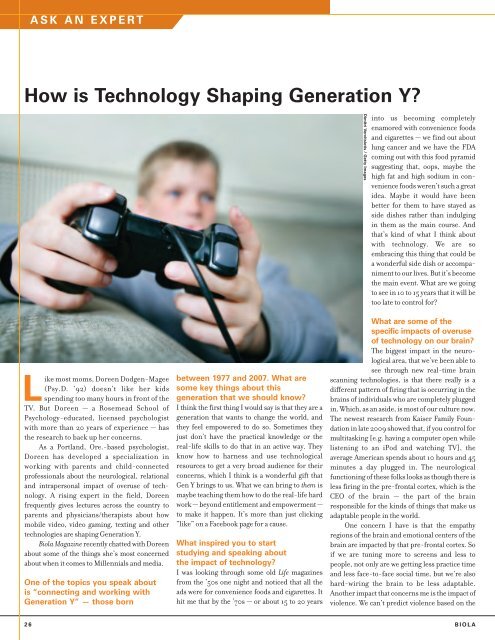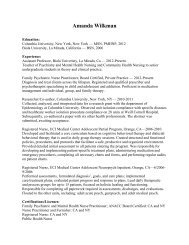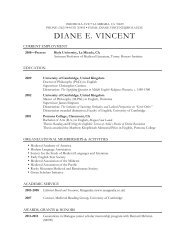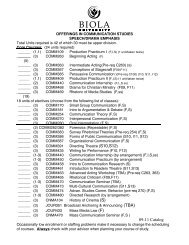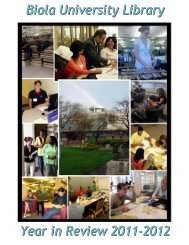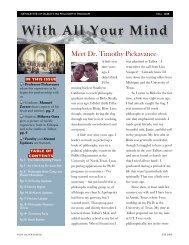You also want an ePaper? Increase the reach of your titles
YUMPU automatically turns print PDFs into web optimized ePapers that Google loves.
2 6<br />
A S K A N E X P E R T<br />
How is Technology Shaping Generation Y?<br />
Like most moms, Doreen Dodgen-Magee<br />
(Psy.D. ’92) doesn’t like her kids<br />
spending too many hours in front of the<br />
TV. But Doreen — a Rosemead School of<br />
Psychology-educated, licensed psychologist<br />
with more than 20 years of exper ience — has<br />
the research to back up her concerns.<br />
As a Portland, Ore.-based psychologist,<br />
Doreen has developed a specialization in<br />
work ing with parents and child-connected<br />
pro fessionals about the neurological, relational<br />
and intrapersonal impact of overuse of tech -<br />
nology. A rising expert in the field, Doreen<br />
frequently gives lectures across the country to<br />
parents and physicians/therapists about how<br />
mobile video, video gaming, texting and other<br />
technologies are shaping Generation Y.<br />
<strong>Biola</strong> Magazine recently chatted with Doreen<br />
about some of the things she’s most concerned<br />
about when it comes to Millennials and media.<br />
One of the topics you speak about<br />
is “connecting and working with<br />
Generation Y” — those born<br />
between 1977 and 2007. What are<br />
some key things about this<br />
generation that we should know?<br />
I think the first thing I would say is that they are a<br />
generation that wants to change the world, and<br />
they feel empowered to do so. Sometimes they<br />
just don’t have the practical knowledge or the<br />
real-life skills to do that in an active way. They<br />
know how to harness and use technological<br />
resources to get a very broad audience for their<br />
concerns, which I think is a wonderful gift that<br />
Gen Y brings to us. What we can bring to them is<br />
maybe teaching them how to do the real-life hard<br />
work — beyond entitlement and empowerment —<br />
to make it happen. It’s more than just clicking<br />
“like” on a Facebook page for a cause.<br />
What inspired you to start<br />
studying and speaking about<br />
the impact of technology?<br />
I was looking through some old Life magazines<br />
from the ’50s one night and noticed that all the<br />
ads were for convenience foods and cigarettes. It<br />
hit me that by the ’70s — or about 15 to 20 years<br />
Dimitri Vervitsiotis / Getty Images<br />
into us becoming com pletely<br />
enamored with convenience foods<br />
and cigarettes — we find out about<br />
lung cancer and we have the FDA<br />
coming out with this food pyramid<br />
suggesting that, oops, may be the<br />
high fat and high sodium in convenience<br />
foods weren’t such a great<br />
idea. Maybe it would have been<br />
better for them to have stayed as<br />
side dishes rather than indulging<br />
in them as the main course. And<br />
that’s kind of what I think about<br />
with technology. We are so<br />
embracing this thing that could be<br />
a wonderful side dish or accompaniment<br />
to our lives. But it’s become<br />
the main event. What are we going<br />
to see in 10 to 15 years that it will be<br />
too late to control for?<br />
What are some of the<br />
specific impacts of overuse<br />
of technology on our brain?<br />
The biggest impact in the neuro -<br />
logical area, that we’ve been able to<br />
see through new real-time brain<br />
scanning technologies, is that there really is a<br />
different pattern of firing that is occurring in the<br />
brains of individuals who are completely plugged<br />
in. Which, as an aside, is most of our culture now.<br />
The newest research from Kaiser Family Foun -<br />
dation in late 2009 showed that, if you control for<br />
multitasking [e.g. having a computer open while<br />
listening to an iPod and watching TV], the<br />
average American spends about 10 hours and 45<br />
minutes a day plugged in. The neurological<br />
functioning of these folks looks as though there is<br />
less firing in the pre-frontal cortex, which is the<br />
CEO of the brain — the part of the brain<br />
responsible for the kinds of things that make us<br />
adaptable people in the world.<br />
One concern I have is that the empathy<br />
regions of the brain and emotional centers of the<br />
brain are impacted by that pre-frontal cortex. So<br />
if we are tuning more to screens and less to<br />
people, not only are we getting less practice time<br />
and less face-to-face social time, but we’re also<br />
hard-wiring the brain to be less adaptable.<br />
Another impact that concerns me is the impact of<br />
violence. We can’t predict violence based on the<br />
B I O L A


